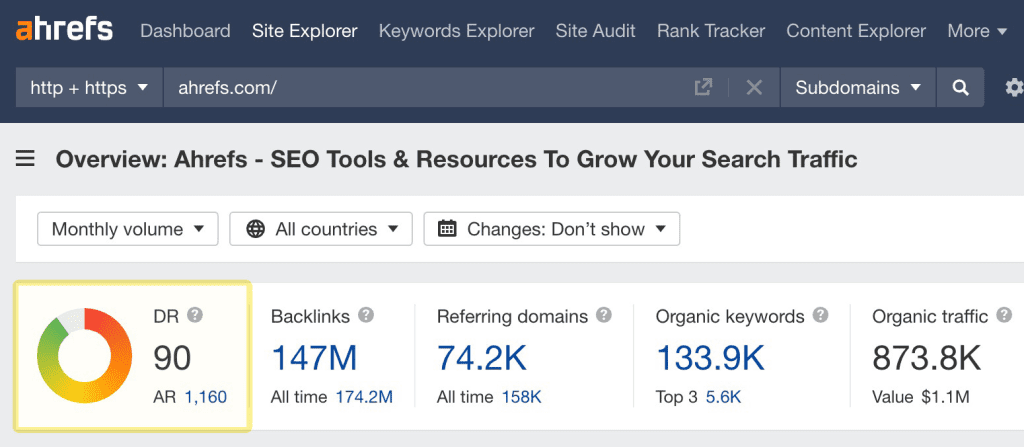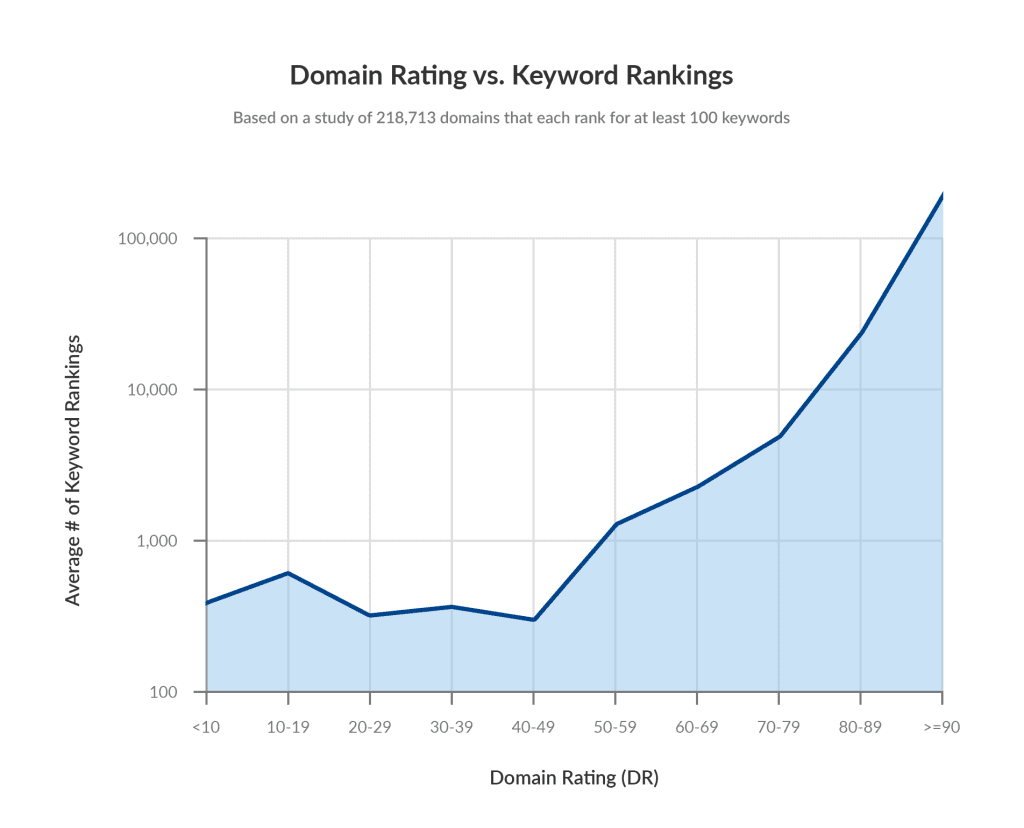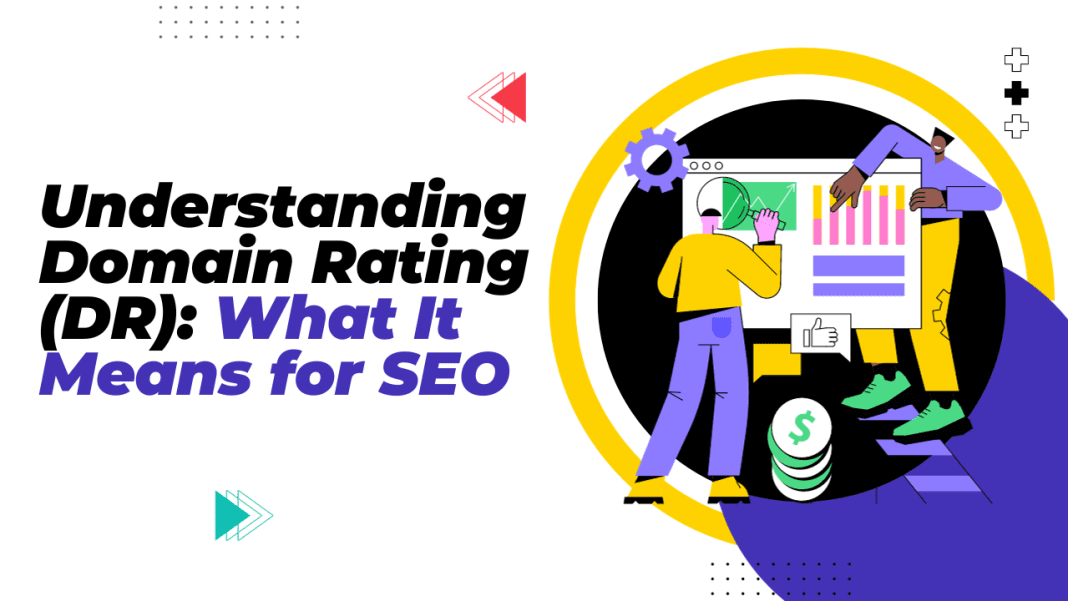Key Takeaways
- Domain Rating (DR) Drives SEO Success: Domain Rating is a critical SEO metric that directly impacts your website’s search engine rankings and organic traffic. Understanding and improving your DR is essential for achieving online visibility and authority in your niche.
- Quality Trumps Quantity in DR: While backlinks are crucial for DR improvement, focus on quality over quantity. High-quality backlinks from authoritative sources have a more significant impact on your DR than sheer numbers.
- SEO Requires a Holistic Approach: While DR is essential, it’s just one piece of the SEO puzzle. SEO success depends on various factors, including content quality, on-page optimization, and user experience. A well-rounded approach to SEO, considering multiple metrics and strategies, is key to long-term digital triumph.
In the vast and ever-evolving landscape of Search Engine Optimization (SEO), one acronym stands out as both a beacon of hope and a source of confusion: DR.
You may have come across this enigmatic term while navigating the labyrinth of digital marketing, wondering what it truly signifies and, most importantly, why it matters for the success of your website.
If you’ve been seeking answers, you’ve arrived at the right place.
Welcome to our comprehensive guide on “Understanding Domain Rating (DR): What It Means for SEO.”
In this digital era, where online visibility can make or break a business, grasping the intricacies of Domain Rating is not just an option; it’s a necessity.
Whether you’re a seasoned SEO professional aiming to fine-tune your strategies or a beginner taking your first steps into the world of search engine optimization, this journey promises to be both enlightening and empowering.
Picture this: You’ve invested countless hours in creating impeccable content, meticulously optimizing your website, and executing what you believed were sound SEO practices.
However, your website’s performance in search engine results pages (SERPs) still falls short of your expectations.
Frustration sets in, and you’re left wondering what’s missing from your SEO puzzle.
The answer, my friend, often lies in understanding and harnessing the power of Domain Rating.
So, what exactly is Domain Rating (DR), and why should you care about it?
Allow us to demystify this vital metric for you.
At its core, Domain Rating is a measure of your website’s authority and trustworthiness in the eyes of search engines like Google.
Think of it as your website’s digital reputation score, much like a credit score in the financial world.
The higher your DR, the more likely search engines are to view your website as a reliable and credible source of information.
But what sets Domain Rating apart from other SEO metrics, and why is it essential for your SEO strategy?
To answer these questions, we need to delve deeper into the world of Domain Rating and explore how it’s calculated, what factors influence it, and most importantly, how it can dramatically impact your website’s visibility in search results.
Imagine this scenario: Two websites, each with similar content and on-page SEO optimization, are vying for the top spot in a highly competitive search query.
One of these websites has a significantly higher Domain Rating than the other.
Which one do you think Google will favour?
The answer becomes apparent – the website with the higher DR is more likely to secure that coveted top-ranking position.
In essence, your website’s Domain Rating wields immense power over its search engine rankings.
It serves as a vote of confidence from the digital universe, indicating that other reputable websites trust and endorse your content.
This trustworthiness factor can be the difference between languishing in the depths of obscurity and basking in the limelight of first-page search results.
Furthermore, Domain Rating isn’t just about ranking higher; it’s about attracting organic traffic – the lifeblood of any online business.
A high DR not only elevates your website’s visibility but also draws more visitors who are actively searching for the products, services, or information you offer.
In short, Domain Rating is your ticket to a steady stream of organic traffic, a metric that can significantly impact your online success.
Now that we’ve established the profound importance of Domain Rating in the SEO landscape, you’re probably wondering, “How can I improve my website’s DR, and where do I even begin?”
Fear not; our journey together will take you through the actionable steps, strategies, and insights required to boost your DR and, consequently, your website’s SEO performance.
In the sections that follow, we’ll explore the nuts and bolts of Domain Rating, breaking down the complex factors that influence it, and unravelling the strategies that can help you scale the heights of SEO success.
From understanding the measurement of DR to demystifying the elements that contribute to it, we’ll leave no stone unturned in your quest for SEO supremacy.
But, as we embark on this enlightening journey through the realm of Domain Rating, it’s crucial to address common misconceptions and set realistic expectations.
SEO is not a magical overnight transformation; it’s a journey that demands dedication, patience, and a commitment to best practices.
So, fasten your seatbelt, sharpen your SEO toolkit, and join us as we embark on this illuminating expedition to uncover the true significance of Domain Rating (DR) in the world of SEO.
Together, we’ll explore the intricacies, dispel the myths, and equip you with the knowledge and tools needed to harness the power of DR for unparalleled online success. Your journey to SEO enlightenment begins here.
But, before we venture further, we like to share who we are and what we do.
About AppLabx
From developing a solid marketing plan to creating compelling content, optimizing for search engines, leveraging social media, and utilizing paid advertising, AppLabx offers a comprehensive suite of digital marketing services designed to drive growth and profitability for your business.
AppLabx is well known for helping companies and startups use SEO and SEM to drive web traffic to their websites and web apps.
At AppLabx, we understand that no two businesses are alike. That’s why we take a personalized approach to every project, working closely with our clients to understand their unique needs and goals, and developing customized strategies to help them achieve success.
If you need a digital consultation, then send in an inquiry here.
Understanding Domain Rating (DR): What It Means for SEO
- What Is Domain Rating (DR)?
- Why Domain Rating Matters for SEO
- How to Improve Your Domain Rating
- Common Misconceptions about Domain Rating
1. Understanding Domain Rating (DR): A Critical SEO Metric
In the ever-evolving realm of SEO, where search engine algorithms continuously evolve, webmasters and digital marketers alike are in a perpetual quest for the Holy Grail: high search engine rankings.
To navigate this dynamic landscape effectively, you must understand the metrics and factors that influence your website’s performance. One such crucial metric is Domain Rating (DR).
What Is Domain Rating (DR)?
Domain Rating Defined:
Domain Rating, abbreviated as DR, is a numerical metric developed by leading SEO software provider Ahrefs.
It quantifies the strength and authority of a website’s backlink profile, specifically focusing on the quantity and quality of backlinks pointing to the domain.
DR is expressed on a scale from 0 to 100, with higher values indicating a stronger and more authoritative website.

Ahrefs’ Influence on the Industry:
Ahrefs is renowned for its comprehensive database of web links, making it a trusted source for backlink analysis and SEO insights.
This has led to Domain Rating becoming a widely recognized and respected metric in the SEO industry.
How Is Domain Rating Calculated?
Backlinks as the Foundation:
At the core of DR calculation are backlinks.
Ahrefs’ web crawlers scan the internet, indexing and cataloguing links from websites across the globe.
These backlinks are the backbone of DR assessment, as they represent a measure of how many other websites trust and link to a particular domain.
Quality and Quantity:
While the quantity of backlinks matters, Ahrefs places a significant emphasis on their quality.
It’s not just about amassing a large number of links; it’s about acquiring links from authoritative and trustworthy sources.
The quality of backlinks is determined by factors such as the linking site’s DR, relevance, and overall trustworthiness.
The DR Formula:
Ahrefs’ algorithm processes the data on backlinks and calculates a website’s Domain Rating based on a proprietary formula.
This formula considers various factors, including the number of unique domains linking to the site and the quality of those domains.
Domain Rating vs. Other SEO Metrics
Comparing DR with PageRank:
You might be familiar with PageRank, Google’s own ranking algorithm.
While PageRank paved the way for understanding link authority in the early days of the internet, it’s important to note that Domain Rating is a more nuanced and sophisticated metric.
PageRank primarily focuses on the importance of individual pages, while DR evaluates the authority of the entire domain.
DR vs. Trust Flow and Citation Flow:
Other metrics like Trust Flow and Citation Flow, developed by Majestic, offer similar insights into a website’s authority and trustworthiness.
However, Domain Rating is unique to Ahrefs and has gained substantial traction among SEO professionals due to its accuracy and reliability.
The Significance of Domain Rating in SEO
Dominance in SERPs:
Why does Domain Rating matter so much in the SEO landscape?
The answer lies in its direct correlation with search engine rankings.
Studies have shown that websites with higher DR tend to rank more prominently in search engine results pages (SERPs).
The Data Speaks:
According to research, there is a clear relationship between DR and organic traffic. Websites with higher DR attract significantly more organic traffic than their lower-DR counterparts.
Trust and Credibility:
From Google’s perspective, websites with higher DR are considered more trustworthy and authoritative sources of information.
This trust and credibility factor can lead to increased visibility in search results and ultimately drive more organic traffic to your site.
Domain Rating (DR) is a critical metric in the world of SEO.
It measures the strength and authority of your website’s backlink profile, reflecting the trustworthiness and credibility of your domain in the eyes of search engines.
Understanding how DR is calculated, how it compares to other SEO metrics, and its impact on search engine rankings is essential for anyone serious about improving their website’s online visibility.
By optimizing your website to increase its Domain Rating through high-quality backlinks and content, you can position yourself for success in the highly competitive digital landscape.
2. Why Domain Rating Matters for SEO
In the complex world of Search Engine Optimization (SEO), understanding the significance of Domain Rating (DR) is paramount.
It’s not just another metric; it’s a powerful indicator of your website’s authority and trustworthiness in the digital realm.
In this section, we will delve into why Domain Rating matters for SEO, supported by relevant data and statistics.
The Impact on Search Engine Rankings
A Strong Correlation:
The relationship between Domain Rating and search engine rankings is undeniable.
Numerous studies and analyses have shown a strong correlation between a website’s DR and its position in search engine results pages (SERPs).
A study revealed that websites with higher DR tend to rank higher in search results.

Organic Traffic: The Lifeblood of Websites
The Organic Traffic Connection:
In the digital landscape, organic traffic is the lifeblood of websites.
It represents users actively seeking information, products, or services and finding their way to your site through search engines.
The DR Advantage:
Websites with higher Domain Ratings enjoy a significant advantage in attracting organic traffic.
Trust and Authority Signals
Trustworthiness in the Eyes of Search Engines:
Search engines like Google aim to deliver reliable and valuable results to users.
To accomplish this, they rely on trust and authority signals.
A high Domain Rating is a potent signal that your website is a trustworthy source of information.
Ranking Potential:
When search engines trust your website, they are more likely to rank your content higher in search results.
This trust extends not only to the page being ranked but also to other pages on your domain, enhancing your overall online presence.
Competitive Edge
Outpacing the Competition:
In a crowded digital landscape, standing out from the competition is challenging.
However, a high Domain Rating can provide the competitive edge you need.
The Data Speaks:
Competitive analysis often reveals that top-ranking websites in competitive niches have notably higher DRs than their counterparts.
This underlines the importance of improving and maintaining a strong DR to remain competitive in your industry.
In the world of SEO, Domain Rating is far from a mere vanity metric.
It’s a critical indicator of your website’s authority, trustworthiness, and potential for success in search engine rankings.
As we progress through this guide, you’ll discover actionable strategies to enhance your Domain Rating, ultimately leading to improved search engine rankings, increased organic traffic, and a more prominent online presence.
The journey to SEO success begins with understanding the importance of Domain Rating, and this section has illuminated its pivotal role in your digital strategy.
3. How to Improve Your Domain Rating
As established, Domain Rating (DR) is a crucial metric in the world of SEO, with a direct impact on your website’s search engine rankings and organic traffic.
To harness the power of DR, it’s essential to actively work on improving it.
In this section, we will explore actionable strategies, supported by data and statistics, to enhance your website’s Domain Rating.
Quality Backlink Acquisition
The Backbone of DR Improvement:
Quality backlinks from authoritative websites are the cornerstone of a high Domain Rating.
Each high-quality backlink is essentially a vote of confidence in your website’s trustworthiness and authority.
Websites that rank in the first Google search result have an average of 3.8 times more backlinks from unique domains compared to those ranking lower. This underscores the importance of acquiring quality backlinks to improve your DR.
Strategies for Quality Backlinks:
- Guest Posting: Contributing high-quality content to authoritative websites in your niche can earn you valuable backlinks.
- Broken Link Building: Identifying broken links on relevant websites and offering your content as a replacement can lead to new backlinks.
- Influencer Outreach: Collaborating with influencers in your industry can result in backlinks from their content.
Content Optimization
Content Quality Matters:
High-quality, valuable, and informative content not only attracts readers but also garners attention from other websites looking to link to authoritative sources.
The SEO Angle:
Optimizing your content for SEO, including on-page SEO elements like meta tags, headers, and keyword optimization, ensures that your content is search engine-friendly and more likely to rank well.
Data-Driven Insight:
A study found that pages with longer content tend to rank higher in Google. The average word count of top-ranking pages is approximately 1,447 words.
Consistency in Publishing
The Value of Consistency:
Regularly publishing fresh, high-quality content not only engages your audience but also keeps search engines coming back to crawl and index your website.
Data-Driven Consistency:
A research revealed that websites that published 16 or more blog posts per month received 3.5 times more traffic than those publishing less often.
Link Reclamation
Recover Lost Links:
Over time, you may lose backlinks due to changes in content, site redesigns, or other factors. Identifying and reclaiming these lost links can contribute to your DR.
Social Signals and Brand Mentions
Beyond Backlinks:
Social signals and brand mentions, though not direct backlinks, can influence your website’s authority and trustworthiness.
The Data Connection:
A study found that pages with a high number of brand mentions tend to rank higher in Google. This suggests that brand visibility and authority matter in SEO.
Improving your Domain Rating is not an overnight endeavor; it requires consistent effort and a holistic approach to SEO.
By focusing on quality backlinks, optimizing your content, maintaining publishing consistency, and leveraging link reclamation and brand mentions, you can gradually boost your DR.
The data and statistics presented here underscore the effectiveness of these strategies in enhancing your website’s authority and, subsequently, its performance in search engine rankings.
The journey to a higher Domain Rating is an investment that pays dividends in the form of increased organic traffic and better visibility in the digital landscape.
4. Common Misconceptions about Domain Rating
In the complex world of SEO, misunderstandings and misconceptions about metrics like Domain Rating (DR) can lead to misguided strategies and missed opportunities.
In this section, we’ll debunk some of the most prevalent misconceptions about DR with the help of data and statistics.
Myth: DR Is the Only Metric That Matters
Debunking the Myth:
While DR is an essential metric, it’s crucial to understand that SEO success is not solely determined by this one factor. Many other metrics, such as Page Authority, Trust Flow, and organic click-through rates (CTR), also play significant roles.
Data-Driven Perspective:
A comprehensive study found that Domain Authority (similar to DR) is only one of many factors that correlate with high search engine rankings. Other factors, such as on-page SEO, content quality, and mobile-friendliness, also contribute to a website’s ranking potential.
Myth: Quantity Trumps Quality in Backlinks
Debunking the Myth:
It’s a common misconception that accumulating a vast quantity of backlinks, regardless of their quality, will boost your DR. In reality, quality is far more critical than quantity when it comes to backlinks.
Data-Driven Insights:
Research has consistently shown that websites with a higher number of referring domains (unique websites linking to them) tend to have higher DR.
However, the quality of these referring domains significantly impacts the overall authority. In other words, a few high-quality backlinks are more valuable than many low-quality ones.
Myth: DR Can Be Improved Overnight
Debunking the Myth:
Improving your DR is a gradual process that requires time and effort. Some might believe that there are quick, magical fixes to skyrocket your DR in a short period, but this is a misconception.
Myth: DR Is the Sole Determinant of Search Engine Rankings
Debunking the Myth:
While DR does influence search engine rankings, it’s not the only factor at play. Google’s algorithm considers hundreds of ranking factors, including content quality, relevance, user experience, and more.
Data-Driven Perspective:
Google’s Search Quality Evaluator Guidelines emphasize the importance of page quality, relevance, and user satisfaction as key factors in ranking decisions. This underscores that DR is just one piece of the SEO puzzle.
Myth: DR Is Universally Applicable
Debunking the Myth:
DR can vary significantly across different industries and niches. Assuming that a specific DR is universally applicable to all websites is a misconception.
Data-Driven Variation:
For instance, websites in highly competitive niches like finance or health may have higher average DR scores compared to websites in less competitive niches.
Understanding Domain Rating is essential for effective SEO, but it’s equally crucial to dispel common misconceptions surrounding this metric.
As we’ve seen through data and statistics, DR is just one part of the SEO equation, and success in the digital landscape requires a holistic approach.
By addressing these misconceptions and embracing a well-rounded SEO strategy, you can make informed decisions to improve your website’s authority, trustworthiness, and overall performance.
Conclusion
In the ever-evolving world of Search Engine Optimization (SEO), understanding the dynamics of Domain Rating (DR) is not merely an option; it’s a necessity.
As we conclude this comprehensive guide on “Understanding Domain Rating (DR): What It Means for SEO,” we embark on a journey that has unravelled the intricate web of this critical metric, offering insights, data-driven wisdom, and actionable strategies to empower your digital success.
Our exploration started with the very essence of Domain Rating – a metric designed to quantify a website’s authority and trustworthiness.
We dissected its calculation, emphasizing the significance of quality backlinks, and we distinguished it from other SEO metrics to provide clarity.
With the foundation laid, we delved into the heart of the matter – the pivotal role of Domain Rating in SEO. We explored the direct correlation between DR and search engine rankings, backed by compelling data.
The statistics left no room for doubt: websites with higher DR dominate the SERPs and attract a flood of organic traffic.
But understanding the importance of DR is merely the beginning. We offered a roadmap for action, unveiling strategies to enhance your DR and, in turn, your SEO performance.
From acquiring quality backlinks and optimizing your content to maintaining publishing consistency and capitalizing on link reclamation and brand mentions, we’ve provided you with a toolkit for SEO success.
In our quest for SEO enlightenment, we addressed common misconceptions about DR, reinforcing the data-backed reality that SEO success is multifaceted, requiring a holistic approach.
DR, while essential, is not the sole determinant of rankings, and there are no shortcuts to instant DR improvement.
Patience and persistence are the true companions on your DR improvement journey. The data underlines that building a solid DR takes time, but the rewards are substantial.
The key is to approach your SEO efforts with a realistic mindset, focusing on sustainable growth rather than quick fixes.
We emphasized the diversity of the digital landscape, where DR’s applicability varies across industries and niches. In recognizing this diversity, you gain a more nuanced perspective on how to tailor your SEO strategies effectively.
As you depart from this guide, armed with a deeper understanding of Domain Rating and its role in SEO, you embark on a journey towards SEO mastery.
The world of digital marketing is ever-changing, but with knowledge as your compass, you have the power to navigate its twists and turns.
In conclusion, Domain Rating is not just a metric; it’s a key that unlocks the doors to SEO success. It’s the compass that guides your website to the top of search engine rankings, attracts organic traffic, and establishes trustworthiness in the eyes of search engines.
Armed with this knowledge, you have the means to forge a path toward greater online visibility, authority, and ultimately, digital triumph.
The journey of SEO is ongoing, and as you continue to refine your strategies, monitor your DR, and adapt to the evolving digital landscape, remember that the pursuit of SEO excellence is an expedition that rewards those who persist and innovate.
So, embrace the power of Domain Rating, harness its potential, and let it fuel your ascent to SEO supremacy. Your digital future awaits, and with DR as your guide, success is not a destination but an ongoing journey of growth and achievement in the dynamic world of SEO.
If you are looking for a top-class digital marketer, then book a free consultation slot here.
If you find this article useful, why not share it with your friends and business partners, and also leave a nice comment below?
We, at the AppLabx Research Team, strive to bring the latest and most meaningful data, guides, and statistics to your doorstep.
To get access to top-quality guides, click over to the AppLabx Blog.
People also ask
How can I check my website’s Domain Rating (DR)?
You can check your website’s Domain Rating using various SEO tools, but Ahrefs is one of the most reliable options. Simply enter your website’s URL into the Ahrefs Site Explorer tool, and it will provide you with your DR score along with valuable insights into your backlink profile.
What is considered a good Domain Rating (DR) score?
While there is no fixed benchmark for a “good” DR score, generally, a DR above 30 is considered decent, and a DR above 50 is considered strong. However, the competitiveness of your niche plays a role, and it’s crucial to focus on improving your DR relative to your competitors.
Can I improve my Domain Rating (DR) without acquiring backlinks?
While backlinks are a significant factor in DR improvement, you can also enhance your DR through content optimization, improving user experience, and boosting brand mentions. However, high-quality backlinks remain a cornerstone of DR enhancement and should be a part of your strategy.
































